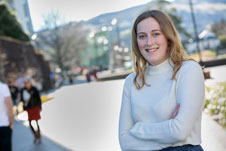 Meghan Evans
Meghan Evans
The University of Otago is the “science university” and this is what attracted Meghan Evans south from Wellington to study biomedical sciences. “It was biomedical sciences from the start for me. I have always wanted to study the science related to medicine and health and my career goal is to become a cancer researcher.”
“When I came to university, I didn't know how much I would love biochemistry, and the BBiomedSc major in Molecular Basis of Health & Disease (MBHD) has just the right mix of papers.” The flexibility of the BBiomedSc degree, and the ability to choose papers that focus on human health and disease, was a real draw. Meghan is now in her final semester and hopes to continue with BBiomedSc(Hons) next year as the next step in the pathway to achieving her career goals.
Another bonus of studying in Dunedin is that Meghan was able to pave her own way - “ it's great to be able to show my parents around when they come to visit.” Living in a residential College in her first year enabled Meghan to make lots of friends and she enjoys spending time with them, especially hanging out at the beach.
Meeting lots of students who are also studying biomedical sciences has made it easy to organise study groups and last year Meghan set up a biochemistry study group that reviewed past exam papers. Meghan noted that “explaining things to each other makes it much easier to understand, particularly as everyone finds a different piece of knowledge to share.” Meghan's A and A+ grades in Biochemistry are testament to the success of this study method, but Meghan does not rely solely on the assistance of her friends and flatmates. “Don't be afraid to ask questions of your lecturers. One of the best things about taking advanced papers is that the classes are smaller and you can build a relationship with the lecturers. And it is their job to answer our questions”.
Meghan also finds that the physical act of writing things out helps her to remember information. She likes to write on her lecture slides so that she doesn't miss any content and then, when reviewing these a few days later, highlights important facts. Using a range of highlighters (green for examples, yellow for key facts, etc) also helps her to organise her studies logically and assists with her understanding of complex topics.
Meghan's advice for new students is simple - “find out what you really like doing and don't be afraid to ask questions”.